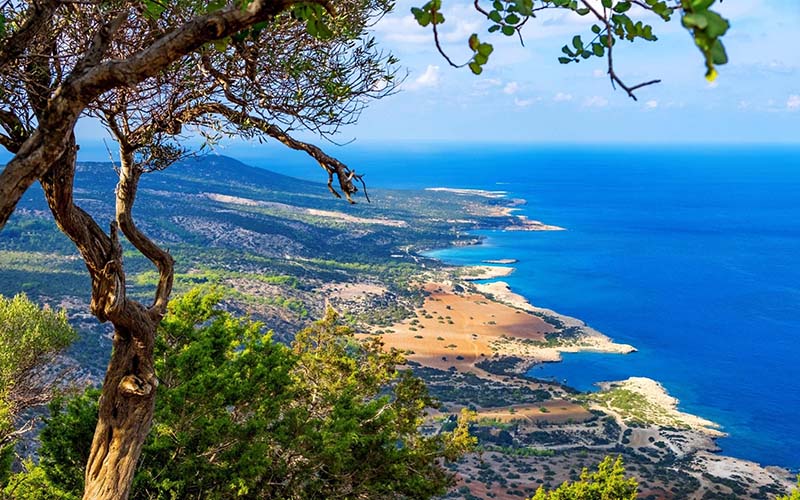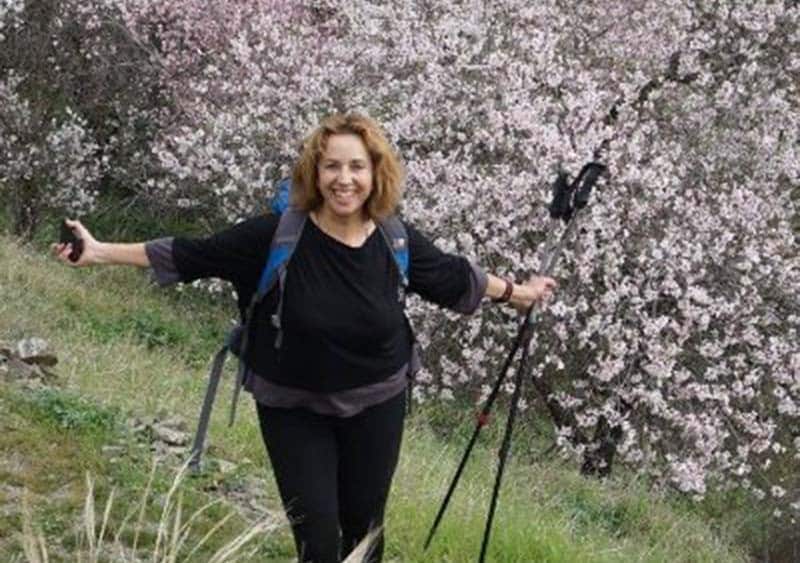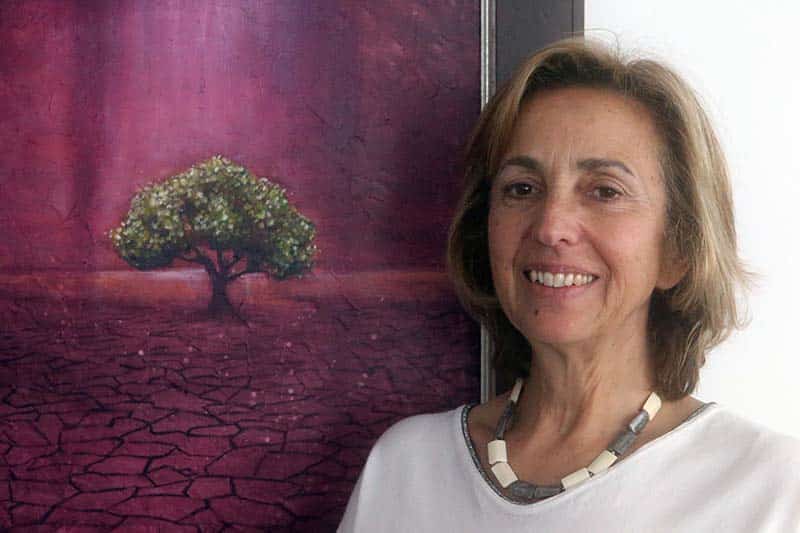In an outdoorsy, fiery architect THEO PANAYIDES meets the woman trying to steer a course between money and natural beauty
When I meet Antonia Theodosiou, in her office on a Friday morning, she’s been Commissioner for the Environment for exactly nine days, since the previous week’s Wednesday; “I’m still finding my feet,” she admits. Indeed, she only got the call from President Christodoulides offering her the post three days before that, on Sunday evening, having only met him once previously. “It was as sudden for me as it was for you.”
“I have no connection to the presidential palace,” she explains, “nor, as I guess you know, was my name put forward by the Movement of Ecologists [a.k.a. the Greens]. It was a personal offer from the president, after he saw me at the inauguration of some work I’d done as former project manager of the Akamas Sustainable Development Management Plan.” That was in Droushia, one of the local villages around the Akamas. “The community council of Droushia had asked me to give a speech – and, in my speech, I laid out the problems of Akamas.”
The president was impressed, recalls Antonia, so much so that he laid aside his prepared speech and spoke off the cuff, vowing to try and solve the issues. “I’m going to try and bring you back,” he told her later – but she assumed he meant renewing her contract (which would also have allowed her to keep working in her architectural practice), not calling up with the Commissioner job. Her office, specialising in eco-projects like the restoration of listed buildings, “was one part of my life,” she says, “and the other part was activism”. She’s had to step back from architecture as part of becoming a public figure – “but activism, and taking part in environmental organisations, isn’t something I plan to give up”.
That, I suspect, was a major part of what caught the president’s attention at the event in Droushia – because activists are supposed to be the sworn nemeses of local communities in Akamas (at least that’s “the myth”, she says dryly), not be invited to give speeches by the community council, let alone write books together; she and Droushia council have a bilingual publication coming up, Rural Life, Traditions – Akamas Peninsula.

The Akamas
Antonia recalls the reaction when she first became project manager in Akamas (her five-year contract expired in 2017). The minister arranged an introductory meeting, but only one village council (Kathikas) even bothered to turn up – “because at that point, the communities were saying, ‘You made us part of Natura [Natura 2000, an EU network of protected areas] and we want out of Natura, so whoever comes representing the government, especially the environment department, on this matter, we don’t want them!’”. It’d be a slight exaggeration to say that she won them all over, indeed there’s one village where she’s still (not by choice) barely on speaking terms – but it’s also true that the locals wrote letters asking for her contract to be renewed in 2017, claiming (as she says) that “It’s the first time someone came here and explained what’s going on to us”.
There are various reasons to explain her success. One is that she’s open to dialogue: “I believe there’s no way that one person can be right and the other wrong. The truth is somewhere in the middle”. Another is that – like most, though not necessarily all activists – she’s not actually against development; she just wants sustainable development. But the most important is perhaps that she knows Akamas intimately, probably more than most locals.
When she was appointed, she recalls, “the villages were arguing whether I’m from this one or that one. It didn’t occur to them that I’m not from Akamas”. She first became professionally involved with the peninsula in 1989, as a young woman (she was born in 1961), when she’d just returned to Cyprus from studies in Germany and was placed in charge of the Laona project, an early EU scheme for non-EU countries – but in fact, “even when I was in school, we used to go to the Akamas… My parents took us all over Cyprus, from one end to the other. Before the invasion we’d go to Apostolos Andreas once a year,” camping out or staying at the monastery. “They really loved Nature, my parents… And we never protested, as kids. We liked it.”
That was unusual in itself; very few families would trek from Nicosia to the far ends of the island, given the infrastructure of the time. Antonia remains quite unusual – and her lifestyle remains very outdoorsy, even now. She’ll stay inside and draw, when she has time (which is to say, almost never) – “but my main thing is to be in Nature, walking for hours”, studying the flora and geology. She’s on the board of a mountaineering club and goes hiking every Sunday even now, as commissioner (last Sunday’s hike was six hours long – but she left after four, having public business to attend to), and is also into swimming and diving.
‘Spear-gun fishing too?’ I ask lightly, already knowing the answer.
“Certainly not! In fact, the group of divers I go with, ever since I started pestering them – well, if they still use spear-guns it’s not in my presence.”
That makes her sound a bit stern – but in fact she’s relaxed and doesn’t stand on ceremony, insisting that we chat in the informal singular. She does seem quite single-minded, though. It’s a trivial (but telling?) detail that she doesn’t like to mix her languages, trying not to throw in English words if she’s speaking Greek or German, as if drawn on some unspoken level to purity and authenticity. So much for globalism.
I detect a certain taste for non-conformity, an affinity with people doing their own thing. She tells an intriguing story about her son (Antonia went through a short-lived marriage in her very early 30s; she got married, had a son and got divorced, all in the space of one year), and an occasion when he was in high school and visited the guidance counsellor with his mum in tow. The boy wanted to study physical education; the guidance counsellor opined that he might have trouble making money later – but Antonia intervened, telling him he should do what makes him happy. (He now has his own gym.) “That’s the first time I’ve seen a parent do that,” marvelled the counsellor.
Is she quite an emotional person?
“Very much,” she replies with a rueful expression. She tries to rein it in, but will often get carried away – “and I don’t think that’s good for politicians, if I count as a politician now. But I’m going to try not to be a politician, and work entirely scientifically.”
It’s only been nine days, of course; not only is she learning the ropes, she’s trying to make sense of the huge volume of work the job entails. (“At the moment, I start in the morning and finish in the morning,” she says of her working hours.) At one point I mention a paradox, that the environment has never been more central – the EU is increasingly consumed with its so-called ‘Green Deal’, which looks certain to impact all our lives – yet Cypriots seem largely indifferent; the Greens’ share of the vote actually went down in the 2021 elections, from 4.81 to 4.41 per cent. It looks like the environment just isn’t a priority for most people, I suggest – but she disagrees.
The commissioner takes part once a week in the Parliamentary Committee on the Environment; she went there on Wednesday, straight after being appointed – and the committee are “swamped with complaints,” reports Antonia. Her office is even more swamped, so much so that she’s trying to find an efficient way to pass them on to the relevant departments “without our having to act as watchdogs all the time – because they’re too many, we’re going to drown in them here”.
Complaints about what?
“There are lots of complaints about dumping rubbish,” she says, the ubiquitous problem of fly-tipping. There’s also the wrinkle of construction companies having, by law, to take their waste to a landfill at their own expense – but many prefer not to pay, “and just dump it anywhere”. Other complaints concern the cutting down of trees, usually when the owners of private land deforest in order to develop it. The commissioner is involved in everything. She just came back – just before our interview – from a meeting on Akamas with the agriculture minister. Yesterday she was at the opening of a photovoltaic park, “the only one I know that’s built in an urban area” as opposed to rooftops or out in the sticks (she and the energy minister had a discussion about the distribution of such parks). On Wednesday she was at the Limassol wine villages – they know her from some workshops she once gave on dry-stone construction – offering advice on how to respond to the Policy Statement on the Countryside, asking villages what kind of development they’d like.

“What I’d like, as commissioner, is to influence [government] departments and decision-making,” says Antonia – and that is indeed her remit, but how far does it go? Her staff is tiny, her role advisory. Giorgos Perdikis, current leader of the Greens (Antonia was among the founding members of the party, later walked away, then returned in 2021), recently claimed that the very existence of the commissioner is superfluous, “since [her] opinions aren’t binding, and the measures which need to be taken about the climate crisis are political”. It may well be that the president was sincere in choosing Antonia – but it may also be a case of choosing a candidate with impeccable credentials for a largely ceremonial post, so he can declare ‘Well, I did my best’ when vested interests inevitably swing decisions away from the environment, and towards development.
Maybe; then again, like she said, the truth is always somewhere in the middle. Her credentials are indeed impeccable – she’s won awards, served on committees, written books, taken part in EU programmes, represented Cyprus at the Biennale – and she didn’t get here by being a fiery activist with a one-dimensional view of the world. Once again, there’s nothing wrong with development – but it has to be sustainable development, the kind that’ll create jobs for locals without destroying what makes Akamas (in the end, it all comes back to Akamas) so special.
Each local village got – or was slated to get – a tourist attraction during her tenure: a museum of geology and paleontology in Arodes, the Akamas avifauna and flora visitor centre in Kathikas, and so on. The plan was (and may still be) for tourists to be ferried by electric buses to these attractions, and throughout the peninsula – but of course the current forestry department plan calls for entrance gates through which private cars will be allowed, with parking spaces in the national park itself. The recent fuss over cack-handed (and destructive) roadworks shows the challenges ahead – and may be why the president chose Antonia Theodosiou for the post, surprising even her, as an Akamas expert from way back able to steer a course between eco-activists and local communities.
Will it succeed? It’s only been nine days, she’s not even sure how the coffee machine works yet (amusingly, she’s brought her own to the interview); “I’ve never had a post like this before,” never been a public figure with journalists traipsing after her. Still, she notes, she has nothing to lose – and besides, “whatever I take on, I’m prepared at any time to walk away, if it’s not working out”. Plus of course she has ideas, and years of experience, and she knows what could be done – if only people will listen. There are ways, insists Antonia, “I’d like to move things in the right direction. And I think I’ll get something done – I think so. I like to think so. Otherwise, I shouldn’t be here”. We wish her well.







Click here to change your cookie preferences